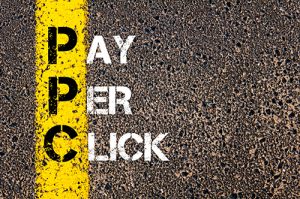-
by Joy Thompson
When it comes to digital marketing there are various strategies that can be employed to generate leads and cultivate those leads to turn them into actual paying customers or clients.

Pay per click (PPC) is one of these strategies, and chances are in your research to find the best marketing strategy for your company, you’ve come across it. But just what is PPC and how does it benefit your business?
Since digital ad spending is on the rise (nearing 78% of total advertising spending in America in 2022), we’ve provided a beginner’s guide to PPC for you to get the most out of your paid advertising campaign and bring in those paying customers or clients!
What is PPC?
PPC is exactly what it sounds like- paying for clicks. Advertisers will create an ad link for customers to click on, these ads can run on search engines like Google or social media like Facebook. The advertiser, however, doesn’t pay a flat rate to run these ads, instead, they pay a small fee every time the ad is clicked on.
PPC ads do not rely on organic traffic or search engine optimization (SEO) to appear at the top of a search engine results page or in the news feed of a Facebook user. Instead, the ad will automatically appear at the top of a Google search page or Facebook will run the ad on the newsfeeds of those users who match your targeted demographic.
PPC Marketing on Google and Facebook
If you own a small business, chances are you have a Facebook page. If you do then you may have seen the option, or even ran a few, to run ad campaigns or boost a post you posted to your company’s Facebook page timeline. This is PPC.
You can either advertise your Facebook page as a whole or just one post you’ve created. Either way, the procedure is the same. You choose how much you want to spend a day, who your targeted demographic is, and how long you wish to run the ad. Facebook does the rest by making sure the ad shows up in users newsfeeds who match your targeted demographic.
And you only pay for each click of your ad link or those that pause long enough to register in Facebook’s system as having read it. The benefit being you could get a few thousand views and likes while paying only a small amount.
The same works for Google ads or Bing. Except your ad will appear at the top of the search engine result page (SERP) whenever someone runs a search using the target keywords you’ve selected. The link will usually lead to a landing page related to the search query of the user. The goal is to create an advertising campaign for your target audience at the lowest cost and drive conversions. Alternatively, there are display ads and YouTube ads that appear on other websites. Display ads are a lucrative tool because browsers track the cookies of the websites users visit and use them to remarket at other websites in the future – that way you are staying at the front of the users’ mind with your display ads.
Get the Most Out of Internet Marketing
PPC is a great way to ensure your ads will get seen by potential customers while ensuring your marketing budget stays low and affordable. It also helps to get a leg up in the competition.
We hope we’ve done a good job of explaining pay-per-click advertising with this PPC guide, but understand that PPC advertising can become quite extensive. For more information on PPC and online marketing contact us today!
Frequently Asked Questions
How Does PPC Marketing Work?
PPC (Pay-Per-Click) marketing is a type of online advertising that allows businesses to place ads on search engine results pages, social media platforms, and other websites. With PPC marketing, businesses only pay when a user clicks on their ad.
To get started with PPC marketing, it may be helpful to work with a digital marketing agency or consultant who can help you develop a strategy that aligns with your business goals and budget.
Can I do PPC myself?
Yes, it is possible to do PPC (Pay-Per-Click) advertising yourself, but it can be a complex and time-consuming process. To successfully run a PPC campaign, you need to have a solid understanding of keyword research, ad copywriting, bid management, and analytics tracking.
If you lack the necessary expertise or resources to manage your own campaigns or PPC budget, it may be more cost-effective and efficient to hire a professional PPC agency or consultant.
What is the best advice for beginners in digital marketing?
The best advice for beginners in digital marketing is to start with a solid foundation of knowledge and then build from there. Some tips for getting started include:
1. Understand the fundamentals of digital marketing, including SEO, PPC, social media, email marketing, and content marketing.
2. Focus on one area at a time and master it before moving on to other areas.
3. The world of digital marketing is constantly evolving, so it’s important to stay up-to-date with the latest trends and best practices.

